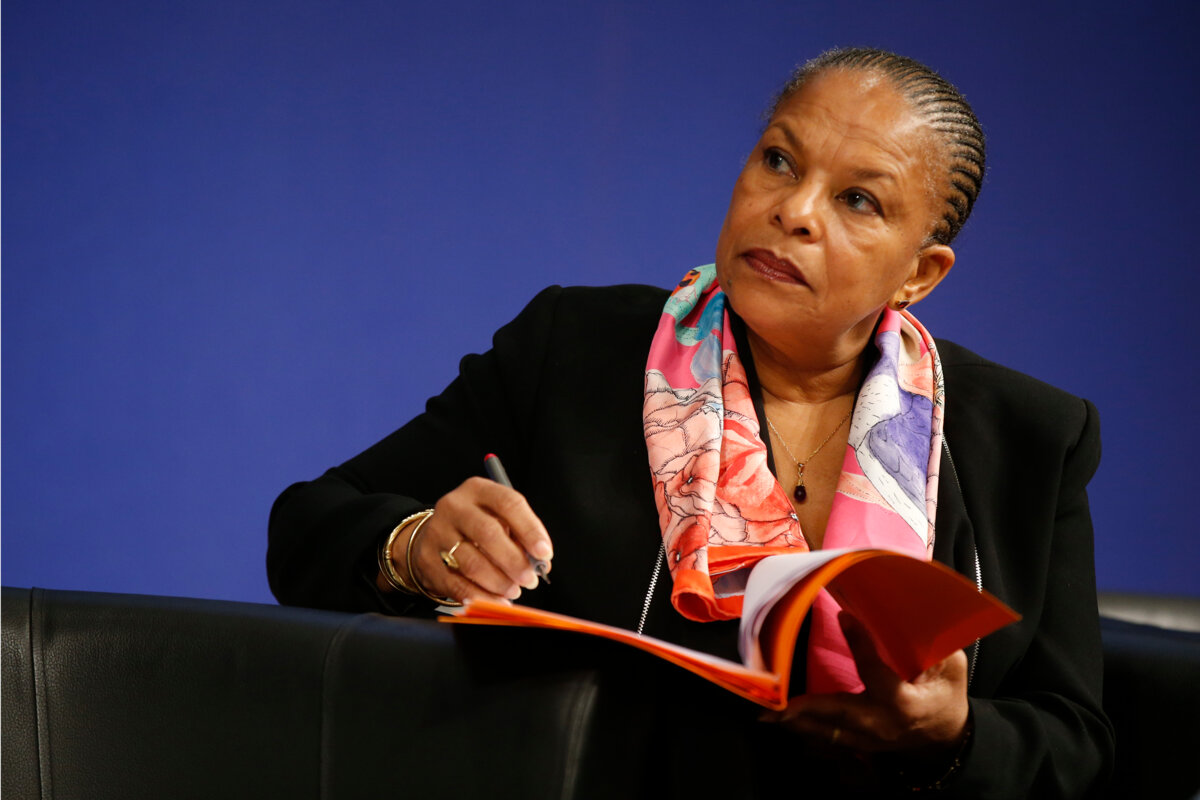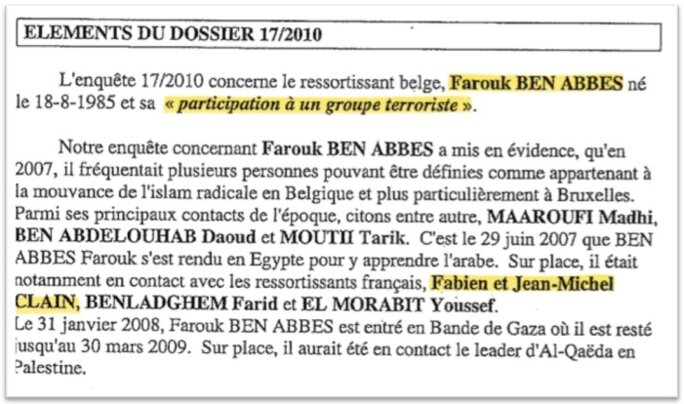Responsibility for the November 13th terrorist attacks in Paris, which left 130 people dead and more than 350 others wounded, was claimed by the Islamic State group in a video posted online and fronted by Fabien Clain, 37, a Muslim convert originally from the French Indian Ocean island of La Réunion.
“In a blessed attack […] targeted the capital of abominations and perversion, that which carries the banner of the cross in Europe, Paris,” Clain said in the 5’30” video, accompanied by religious chants which, according to French daily Le Monde, citing a source close to the French investigation into the massacres, were sung by Clain’s 34-year-old brother Jean-Michel.
Among the several attacks by gunmen and suicide bombers in and close to Paris on the evening of November 13th, the highest death toll by far was caused by the shootings at the Bataclan theatre and music hall where, during a concert by the US band Eagles of Death Metal, 90 people were killed and another 99 seriously wounded.
Earlier this month, French investigative and satirical weekly Le Canard enchaîné revealed that a judicial investigation was opened five years ago into evidence of a plan already established by Islamic terrorists to attack the Bataclan. “For the moment, it is not proven that there could be the slightest link between the people who were implicated at the time and the terrorists who committed the attacks of November 13th,” said French justice minister Christiane Taubira questioned by TV channel TF1 shortly after the report.

Enlargement : Illustration 1

But Mediapart can reveal that not only does a link exist between the projected attack against the Bataclan in 2010 and that which occurred this November, but also that the French authorities were made aware by Belgian police in 2011of the close relationship between the main suspect in the 2010 plot - Farouk Ben Abbes, a Belgian national of Tunisian origin - and Fabien Clain, the French jihadist who appeared in the Islamic State (IS) video in November and who is believed to lead a French-speaking IS group in Syria.
The revelation raises further questions about the effectiveness of, and cooperation between, France’s counter-terrorism services, which have already come under sharp criticism following the January 2015 terrorist attacks in Paris which left 17 dead and 22 wounded, and the shooting rampage of Toulouse Islamist Mohamed Mehra in March 2012, which left seven dead and six wounded. All of the perpetrators of these attacks were known to, and had been temporarily under surveillance by, the intelligence services.
In a report dated May 26th 2011 (see below) and obtained by Mediapart, the Belgian counter-terrorism services notified their French colleagues that: “Our investigation concerning Farouk BEN ABBES has established that in 2007 he met with several people who can be described as belonging to a radical Islamist movement in Belgium, and more particularly in Brussels […] It was on June 29th 2007 that BEN ABBES Farouk travelled to Egypt to learn Arabic. There he was notably in contact with French nationals Fabien and Jean-Michel Clain […].”

Enlargement : Illustration 2

The contents of the May 2011 Belgian police report were immediately passed on to the French judicial investigation into a grenade attack at a market in the Egyptian capital Cairo on February 22nd 2009, in which a 17-year-old French girl, Cécile Vannier, was killed.
The attack appeared to specifically target a school group of French teenagers during their visit of the Khan el-Khalili souk. A total of 24 people were wounded, including 17 among the young French tourists.
Under French law, the justice system is empowered to investigate the deaths of French nationals abroad. It was from evidence collected in the investigation into the Cairo attack that the first plot against the Bataclan emerged.
A report by the French foreign intelligence services, the Direction générale de la sécurité extérieure (DGSE), would later conclude that the attack against the French schoolchildren was in retaliation for the participation of a French frigate, the Germinale, in an Israeli-led naval blockade of the Gaza strip in January 2009 set up to prevent the landing there of smuggled weapons.
On May 23rd 2009, Egyptian security forces arrested seven people in connection with the souk attack, including Farouk Ben Abbes and Dude Hoxha, a French national of Albanian origin. She was known to French police as having links to Islamist militants.

Enlargement : Illustration 3

In March 2010, Ben Abbes was extradited from Egypt to Belgium, and Hoxha was expelled to France where she was placed under surveillance by the domestic intelligence services, the DCRI (now renamed the DGSI). In October 2010, after several months of phone taps and physical tails, Hoxha was arrested and held for questioning over 96 hours.
The DCRI obtained from the Egyptians a personal diary Hoxha kept during her several months in jail in Cairo. It begins with a warning: “You who have just opened this notebook -yes, yes, you – who gave you the authorization to open it? […] If you go further without my authorization, know that before Allah you will be answerable to me. I leave you between yourself and your conscience [sic]. Salam.” In an entry dated January 20th 2010, she refers to a conversation with a woman friend called Fatima who was arrested along with Hoxha in connection with the Cairo blast. “One day when I told her that if it’s really true that Farouk [Ben Abbes] (one of the brothers arrested with us) had the plan of blowing up the Bataclan in Paris, then they are right to keep him in prison, that I don’t like those types of things.”
She then explains the reason for the project to attack on the Bataclan. “What’s more, the Bataclan in Paris, no but really! What an idea!! What does she [Fatima], this crazy woman, reply to me? That it’s not even a land of jihad? That the people over there have nothing to do with the Israeli-Palestinian conflict? No! She tells me: ‘Do you think that the brothers target any old place? Most certainly the boss [editor’s note: of the Bataclan] is a Jew who finances the Israeli army and that it will make a hole in the till.”
What Hoxha writes next is a chilling account of the exchange between her and ‘Fatima’.
“Me: ‘But the people who go to the Bataclan have nothing to do with all that. They go to see a performance and they end up dying. Her: ‘For one thing, they have no reason to be there, shows are haram [prohibited under rigorous Islamic rules] and [it] will encourage the others not to go there anymore and to no longer finance the Jews.”
The May 26th 2011 Belgian police report handed to the French justice authorities notes: “On January 31st 2008, Farouk BEN ABBES entered the Gaza Strip where he stayed until March 30th 2009. There he [reportedly] met with the leader of al-Qaeda in Palestine.” That terrorist group, identified by the Egyptian and French police as Jaysh al-Islam, meaning ‘Army of Islam’, was held responsible for the grenade attack in the Cairo souk in 2009 which killed French teenager Cécile Vannier – and which a report by the French foreign intelligence service at the time, the DGSE, concluded was “to make France pay for the participation of the frigate Germinal in the blockade of Gaza”.
On the basis of evidence that emerged from the investigation into the 2010 Cairo grenade attack, a separate judicial investigation had been opened into the plot against the Bataclan theatre, led by Judge Christophe Teissier. Ben Abbes was arrested in France and placed under investigation (a legal status one step short of being charged) for his role in the plot.
When the Belgian police passed on their report to their French colleagues in May 2011, Ben Abbes was serving preventive detention at Fleury-Mérogis prison near Paris. On top of the Bataclan case, he was also placed under investigation on May 4th 2010 for “associating with criminals with the aim of preparing terrorist acts” over his suspected role in the recruitment of jihadists via the internet.
At the same time, Fabien Clain was serving a five-year sentence handed down in 2009 for his part in a jihadist recruitment organization.
Despite the evidence of the longstanding close links between the two jihadists, Clain was released from prison in 2012, and would later disappear without trace. On September 14th that same year, Judge Teissier found there was insufficient proof to bring charges against Ben Abbes in the Bataclan plot, and the case against him was dropped. However, he remains today implicated in the separate case opened in May 2010 into his suspected participation in a jihadist recruitment network via the internet.
Judge Teissier is one of several magistrates in charge of judicial investigation into the terrorist attacks in Paris this November. Yet Mediapart understands that Ben Abbes, despite having been suspected of a plot five years ago to attack the Bataclan theatre, and despite his continued implication in the investigation into his role with a jihadist recruitment network, had by last week still not been questioned about the November 13th shootings and bombings.
Ben Abbes’ lawyer, William Bourdon, said his client was currently under house arrest under the powers of the state of emergency declared in France following the November attacks.
Dude Hoxha remains the only person to have been placed under investigation in the French probe into the Cairo souk attack and today lives on conditional bail in a Paris suburb.
-------------------------
The French version of this article can be found here.
English version by Graham Tearse


